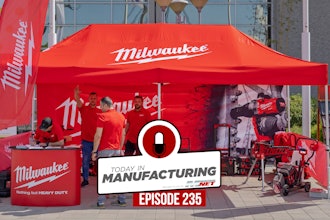|
"With that in mind, the reasons to buy American are simple; Better products. Closer to the user. Less inherent risk." |
The typical argument for buying American products through American suppliers tends to focus around themes of keeping U.S. dollars here at home, supporting our workforce, plants and marketplaces, or wrapping one’s self in the flag so when we approve that purchasing order or bid from an American company, you can feel a sense of pride in doing all you can to support your country. The problem with these concepts is that although they stem, in most respects, from a collective sense of pride and patriotism, those are not the right reasons to look for products flying Old Glory on the label.
The bottom line is that we live in a global marketplace. This translates to a huge collection of varying consumer preferences and marketplace demands that have produced varying levels of price point acceptance. So in order to compete, sometimes lower priced components and products produced overseas are a necessity for even the most patriotic of companies.
These low-cost items obviously have a negative impact on U.S. manufacturing jobs, but they also place a premium on the sales and distribution arms necessary to service the American public, which represents arguably the largest consumer marketplace in the world. These purchasing decisions, while often painful, also help ensure that jobs in sales offices and distribution centers are not negatively impacted.
With that in mind, the reasons to buy American are simple; Better products. Closer to the user. Less inherent risk.
It is not based on an overwhelming sense of pride that I say U.S.-made products are better. It’s because U.S.-made products, in general, are made better. Okay, I can hear the inbox flooding with vehicle and consumer electronics comparisons, so just give me a minute.
True, Toyota, BMW and others in the automotive realm have consistently beat up the Big Three, but that’s more about design than production, and many of those companies have expanded their American manufacturing presence. It’s safe to say that most U.S.-made mechanical components, industrial equipment and healthcare products, to mention a few, feature better materials and stricter inspection policies that lead to longer-lasting products. Some European options are on par in terms of quality, but the added expense doesn’t equate to the American alternative for a premium selection.
The simple notion of a quicker delivery mechanism that doesn’t rely upon container ships and delivery dates measured in weeks instead of hours offers another, more obvious reason to go with American sources. This also offers quicker adaptability to changes stemming from troubled product launches and rapidly evolving customer needs.
Finally, there is a benefit when you can get in a car or take a short plane ride to see where your supplier is making that which you are buying. Granted there are exceptions to every rule, and in this case it would probably be peanut butter from Georgia, but what if the source of that issue was a Mexican or Asian plant – would the reaction have been as swift in identifying the problem’s origin?
At the end of the day, buying American products shouldn’t be based on patriotic obligations or some form or marketable charity for our fellow countrymen and woman. Rather, these decisions should be based on what makes the most sense for your business – now and in the future. In many instances purchasing abroad will be the right choice, but remembering the premium benefits registered by U.S. suppliers can serve your customers, your employees and your business best in a number of situations.
What's your take? Email [email protected]
Click here to read Editor Anna Wells' take on buying American
I agree with much of what Jeff Reinke has said here. I would go one step further and say that the sometimes misplaced patriotism involved in the decision to buy American should be reapplied to the American manufacturing processes. When we believe in, and can deliver, the best products with the lowest true cost of ownership people will beat a path to our door. We have seen a steady slide in the sense of pride in American manufacturing. Sourcing inferior foreign products, often with higher total ownership/operational costs, became the order of the day because many managers had their eye on the wrong ball. This was compounded by the fact that the public has not been made aware of that real cost of ownership and manufacturers made little to no effort to educate them. Hopefully the economic downturn will bring common sense and patriotism into full focus. As Americans regain their sense of value in their purchases the service end of the bargain becomes more pronounced. Smart manufacturers will take advantage of the fact that in this climate they can further differentiate their products with high quality domestic service. |
I agree we need global trade but when does it end? (Some companies are) sending jobs offshore after shutting down profitable manufacturing facilities. We are an example (of this). Our facility is going to be shut down in the next few months and our product outsourced to China. |
My personal take on the issue is that everything I have purchased that is made in the USA has been better quality, lasted longer, and served me better over the long run. I believe that we have become a “disposable society” over the last few decades and we are losing our edge. I have always owned American cars—Pontiac, Ford, Olds, Chrysler, GM—and all of these vehicles have lasted me 10+ years or more (current Ford is 11 years old with 176,000 miles). The only failure items have been foreign components (radio display, electric door switches, etc.), so the “better quality” moniker for foreign cars is not all it’s cracked up to be in my opinion. I realize that some components are not even produced in this country anymore so we must go with foreign products. It is unfortunate that “we” have decided that we can’t compete with foreign labor costs to make some vital components. But it is not that we can’t compete. Our union wages, healthcare and pension costs have driven us out of the markets where we were once competitive with everyone. Until we get a handle on those costs, we are doomed to purchase inferior products, made by cheap labor with no benefits, in countries that have no human rights or fair pay standards. I will buy American at every opportunity and will pay a premium to do so. Unfortunately, many products are not made in the USA anymore and we are forced to buy cheap inferior products. |
Thank you for your excellent articles. Actually, I don't think you two are too far apart in your opinions. I straddle many positions as a consumer, an employee and also as a small business owner. Sometimes IT IS good to buy something just because it is American. Our family and friends are unemployed because we made the “cheap” choice. When a person goes from making $20+ per hour to $7 per hour in a service job they don't have the disposable income to buy anything other than necessities or “cheap” imports. I have no problem buying imported junk when it is a throwaway item or something I cannot imagine using twice. I own a foreign vehicle made in the U.S. and a Japanese vehicle made in Japan. I would love to own a vehicle produced by the Big 3, but the quality is gone there. I encourage my employer to purchase American made whenever possible, but it is not always possible because quality is the main concern. We recently had an American made sump pump fail. The reason was a Mexican made internal switch, clearly poor quality and purchased because of the price. In my industrial supply business I sell mostly American made products, but I'm fairly certain that one of my generic products with the largest margin is from Asia. The reason, again, is quality. I live by the motto “The bitterness of poor quality lingers long after the sweetness of a low price is gone.” I think that quality IS the bottom line. |


















